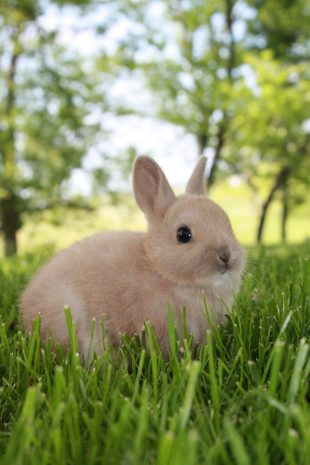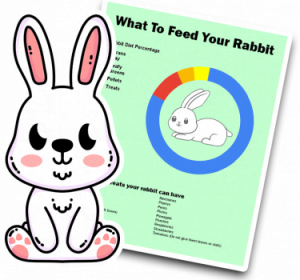
A Dwarf Rabbit Breed (Commonly known as a mini rabbit) will typically live anywhere between 10-12 years whilst indoors and 7-9 years when kept in an outdoor hutch.
In most cases, a dwarf rabbit will have dental issues and will require consistent care from twice a day fresh vegetables and continuous amounts of hay.

A Dwarf Rabbit is usually on the smaller end of rabbit breeds weighing less than 1kg when they reach adulthood.
Their fur coats are relatively short and velvety meaning that they only require assistance grooming once a week.
Dwarf Rabbits whilst very timid are very sociable and as such would require a paired/bonded partner. If possible try and find a suitable companion of the opposite sex who has been neutered or spayed.
Dwarf Rabbits are not suitable for new rabbit owners or small children, this is due to their very fragile body and temperament. If you have older children or a home where you can spend lots of time interacting with your rabbit, this is a perfect breed.
There is nothing specific to the Dwarf Rabbit which is considered a health risk, they will require the same standard for rabbit health:
Most of these can be prevented by taking your rabbit to the vets multiple times a year and having regular vaccinations.
| Dwarf Breed | Avg Weight | Life-Span |
|---|---|---|
| Netherlands Dwarf Rabbit | 2.2-2.5 lbs | 7 – 12 years |
| Dwarf Lop Rabbit | 4.0 – 6.0 lbs | 9 – 10 years |
| Dwarf Hotot Rabbit | 2.5 – 3lbs | 7 – 10 years |
| Dwarf Lionhead | 3.25 – 3.8lbs | 7 – 9 years |
| Columbia Basin Pygmy Rabbit | 0.5 – 1lbs | 3 – 5 years |
| Jersey Wooly Rabbit | 1 – 3lbs | 7 – 10 years |
| Mini English Angora Rabbit | 2.5 – 3.5lbs | 7 – 10 years |
| Miniature Cashmere Lop Rabbit | 3.0 – 3.5lbs | 9 – 10 years |
| Britannia Petite Rabbit | 1.5 – 2.5lbs | 7 – 10 years |
There is no ‘best’ size cage for a Dwarf Rabbit, ideally, you want to fit the same requirements for every breed of rabbit regardless of size. The cage should be as large as possible, even if this simply means a cage with an extra run area.
The cage should have enough room to allow your rabbit to stretch and exercise in, with an unlimited amount of hay, regular portions of food, unlimited water and a place to relax.
If you are pressed for space, make sure your rabbit gets plenty of exercise, this doesn’t change across any breeds, ideally, your rabbit should have free access to exercise as much as possible.
We typically suggest having Dwarf Rabbits reside only indoors as they are extremely vulnerable to outdoor prey; birds, foxes etc. Their size and stature make them a very easy target.
Please do not use wire floors in your rabbits cage, whilst many sites will explain that they are the safest and easiest to clean they are also prone to giving your rabbit sore hocks due to the pressure of the wire on their feet.
Combine sore hocks wounds with urine covered metal wiring and you’re going to have a problem.
Instead, toilet train your rabbit to use the loo in one specific area (We often suggest a cats litter tray), that way they can avoid getting ill and getting sore hocks.
There are no problems with having your rabbit sit in their own poop, however, you do want to use high absorption pellets to drain their urine and regularly change their toilet.
If you’re feeling particularly DIY and have a wooden floor cage, you can coat the bottom in resin and simply wash out the cage with a hose when it needs cleaning.

By entering your email address you agree to receive emails from Cottontailclub. We'll respect your privacy and you can unsubscribe at any time.